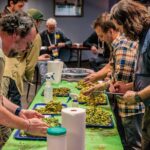(KALAMAZOO, Mich) — The Hop Growers of Michigan presented the 7th Annual Michigan Chinook Cup last week at the 2024 Michigan’s Great Beer State Conference & Trade Show at the Radisson Plaza Hotel in Kalamazoo. The conference, which hosted nearly 500 attendees including more than 50 industry speakers, was presented by the Michigan Brewers Guild, Master Brewers Association of the Americas – District Michigan and Michigan State University Extension.
Alec Mull, General Manager at Bell’s Brewery and past president of the Hop Quality Group (HQG) presented the 1st Place award to Mark and Sean Trowbridge of Top Hop Farms in Goodrich, Michigan. They will again have their farm name engraved on the Chinook Cup and will receive a Keepsake Cup to proudly display at their facility.
Second place was awarded to Bonnie Steinman of Bell’s Brewery Estate Hopyard, Comstock, with third place honors presented to Rick Kawalski of Hop Head Farms in Hickory Corners.
Modeled after the HQG’s national Cascade Cup, the Michigan Chinook Cup is awarded to the Great Beer State’s best Chinook hop grower as determined by a panel of expert craft brewers through a series of blind sensory tests. This year, six Chinook entries were ranked with scoring provided for aroma, appearance/color and brewing values. The expert judges included John Mallett; Jeremy Kosmicki and Jason Vrosh from Founders Brewing Company; Alec Mull and Andy Farrell from Bell’s Brewery; Brian Confer and Chris Schneff from Stormcloud Brewing Co., and Josh Mayich from Island Hop Company.
Although there are over 100 different varieties of hops used by craft brewers across the U.S., three of the top publicly available hop varieties have consistently been Cascade, Centennial and Chinook. The Chinook hop, released in 1985, is the result of a cross between Petham Golding and a USDA male plant. Chinook are a “dual purpose” hop used for both bittering and aroma. In their quest to brew “standout” flavorful beers, many craft brewers have become increasingly interested in newer proprietary varieties such as Simcoe and Citra. However, a small but growing number of brewers have begun to recognize that hops of the same variety, when grown in different locations with distinct soils and climate, impart different flavor profiles. In contrast to Chinook grown in the Pacific northwest that is generally known for its piney, spicy, dank attributes, Michigan Chinook is a cultivar that is increasingly recognized for its citrusy, clean profile. Visit Michigan State University Extension’s hop webpage for more information on Michigan’s growing hop industry.
Michigan is currently ranked first in the Great Lakes Region and fourth in the nation (behind three states in the Pacific Northwest) with nearly 500 acres in hop production. More than 40 different hop cultivars are grown in Michigan, with Chinook being among the most prevalent and popular. Hops are part of Michigan’s overall $104 billion agricultural industry, supporting a strong craft beer culture.
Hop Growers of Michigan (HGM) was formed in 2015 as a 501(c)5 non-profit organization. HGM makes a positive difference in Michigan’s hop industry by supporting educational opportunities and research for better hop production and processing, as well as advocating for and promoting the use of Michigan-grown hops. HGM also facilities best practice exchanges, sharing of techniques and knowledge; enlists the support of Michigan higher education institutions for research and development of hop horticulture and processing; promotes and markets the utilization of Michigan hops; and partners with other organizations to advance the interest of Michigan hop growers and craft brewing.




Bookmarks (1)